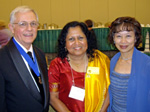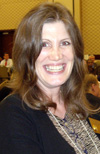Campus Toastmasters recognize
distinguished members
Scared of
speaking in public? Getting ignored for job promotion and advancement?
Toastmasters International offers a non-profit educational program that
helps improves communication and leadership skills. There are 33 toastmaster clubs in the Lowcountry and 117 clubs in South Carolina (District 58). This district ranked No. 1 in the country and No. 5 in the world in 2006.
MUSC Toastmasters, started in 2002 for MUSC faculty, staff and students, has maintained the president’s distinguished status through the years.
 DTM's Dr. Subbi
Mathur, center, is joined by District 58 S.C. Toastmasters Gov. Douglas
Wilson and Internationl director Margaret Wann.
DTM's Dr. Subbi
Mathur, center, is joined by District 58 S.C. Toastmasters Gov. Douglas
Wilson and Internationl director Margaret Wann.This year, two of its members garnered the title of Distinguished Toastmaster (DTM), the highest title in the program. The title is earned after presenting at least 44 speeches and leadership seminars from advanced communication and leadership manuals while participating in District 58 administration and conducting leadership programs in the community.
 Jennifer Shambrook
Jennifer ShambrookSubbi P. Mathur, DTM (Division A governor in charge of 17 clubs in the Lowcountry including Beaufort and Hilton Head) and Jennifer Shambrook, DTM (former area governor), both members of MUSC Toastmasters, were inducted as DTMs during the conference of District 58 Toastmasters held on Oct. 20 in Myrtle Beach. Mathur is a retired professor with the Department of Obstetrics/GYN in the College of Medicine. Shambrook is a research director in the Department of Psychiatry.
Facts about toastmaster program
The mission of the club is to provide a mutually supportive and positive learning environment in which members have the opportunity to develop communication and leadership skills and foster self-confidence and personal growth. The goals are:
- Build self-confidence in public speaking
- Sharpen organization and delivery skills
- Incorporate effective body language and facial expression
- Improve grammar, vocabulary and pronunciation
- Help reduce stress about giving an oral presentation
- Develop leadership skills, and
- Focus in technical planning and execution
What happens during a program
In a typical meeting (approximately an hour), the members will give talks of general interest or on technical topics, followed by constructive feedback from peers. This is a way to practice relevant technical presentations in a comfortable and friendly environment.
Both the person presenting and those in the audience will benefit from this format with the net result being improved communication skills that will enhance career advancement.
Four Toastmasters Clubs serving MUSC
- MUSC Toastmasters meets from noon to 1 p.m., Wednesdays MUSC Harper Student Wellness Center Executive Conference Room. Contact Rajesh S. Mathur, mathurrs@musc.edu; or Marlena A. Davis, davismah@musc.edu
- International Scientific Presenters Toastmasters focuses on scientific presentation and leadership skills needed by post-doctoral fellows, graduate students and junior faculty of MUSC. Meets from noon to 1 p.m., Thursdays. E-mail Rebeca Mueller at muellemr@musc.edu
- Health Speakers Toastmasters is open to staff, students and faculty of the College of Health Professions and well as employees of MUSC Rutledge Tower facilities. Meets from 12:05 to 12:55 p.m., Fridays in a lecture room in the College of Health Professions. Contact Mathur, Ph.D., at mathurs@musc.edu (556-5966); Richard Aust (aust@musc.edu) or Kiren McCormack (mccormac@musc.edu).
- Bee Successors Toastmasters meets at 12:30 p.m., first and third Thursdays, fourth floor nursing care unit dining hall, VA Hospital. Contact Mathur.
Friday, Nov. 23, 2007
Catalyst Online is published weekly,
updated
as needed and improved from time to time by the MUSC Office of Public
Relations
for the faculty, employees and students of the Medical University of
South
Carolina. Catalyst Online editor, Kim Draughn, can be reached at
792-4107
or by email, catalyst@musc.edu. Editorial copy can be submitted to
Catalyst
Online and to The Catalyst in print by fax, 792-6723, or by email to
catalyst@musc.edu. To place an ad in The Catalyst hardcopy, call Island
Publications at 849-1778, ext. 201.